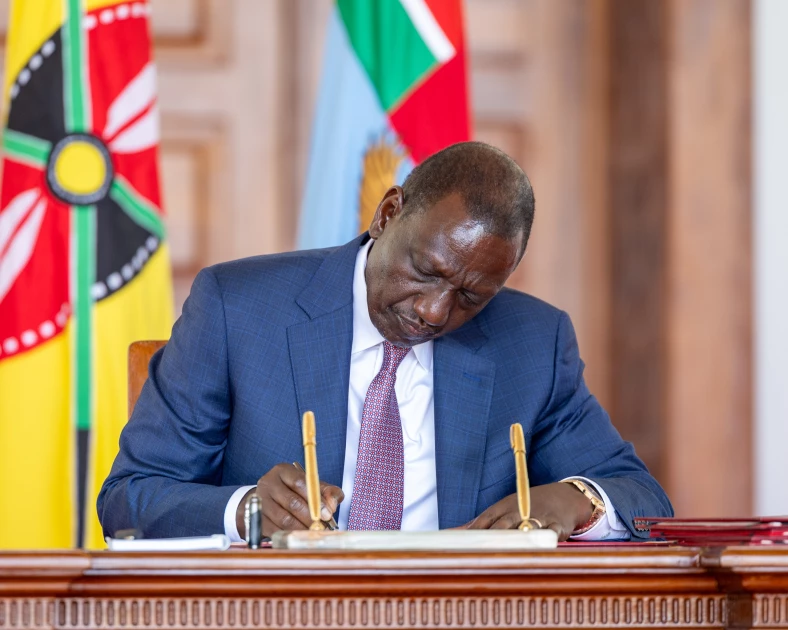Ruto disregards court order again in appointment of IEBC commissioners

File image of President William Ruto.

Audio By Vocalize
He also formalized the appointment of Ann Njeri Nderitu, Moses Alutalala Mukhwana, Mary Karen Sorobit, Hassan Noor Hassan, Francis Odhiambo Aduol, and Fahima Arafat Abdallah as commissioners of the electoral body.
The President made this on the strength of powers conferred to him by Article 250(2) of the Constitution, as read together with Section 5(2) and Paragraph 4 of the First Schedule to the IEBC Act.
But even as this was within his mandate, it ran contrary to a court ordered issued on May 19, 2025. The High Court issued conservatory orders blocking vetting and approval of the IEBC appointees by the National Assembly, pending the determination of a petition filed by two individuals.
The President, by publishing the appointments formally, ignored the court order and possibly set up another round of bad blood between the executive and the judiciary which ideally should act independent of the other two arms of government.
The petitioners who sought the court orders, contend that the process of choosing the IEBC commissioners was unlawful and that some of the nominees do not meet the eligibility threshold for appointing Kenya’s electoral commissioners.
The National Assembly, in concert with the executive, told the court that halting the process would disrupt a constitutionally time-bound exercise and undermine public participation.
A track record in disregard of court orders
Before this latest disregard of a court order, on January 3, 2024, President Ruto, while at a function in Nyandarua, vowed to disregard court rulings or injunctions which he said were meant to derail his government agenda, especially if those injunctions were issued by "corrupt" judges.
To indicate the seriousness of his words, he ordered the Roads Principal Secretary, notwithstanding active court orders, to ensure the resumption of construction for a road in the Nyandarua region that had stalled courtesy of a legal feud.
The issue of disregard for court orders drew so much heat back in 2024 that Chief Justice Martha Koome had to jump in and give her side of the story.
On January 15, she condemned President Ruto’s administration’s blatant disregard for court orders and his onslaught on the judiciary.
Later, on January 22, due to public alarm at dysfunctional arms of the government, President Ruto held a meeting with CJ Koome at State House in a bid to end the stand-off between the Executive and Judiciary. That was when things cooled down… but it seems this was just a lull before another storm.
Uhuru’s disdain for court orders
June 8, 2020 might not ring a bell in the minds of many Kenyans but to a good number it is still vivid. Retired Chief Justice David Maraga took the bold step to declare President Uhuru Kenyatta out of order for continued defiance of court orders.
Maraga gave his courageous statement that was deemed reckless! No other judicial official dared walk out with him to the press conference that morning.
He stood solitary to address the press but seemed unperturbed. He was however uttering the obvious, the president and by extension his officials were in blatant disregard of court orders and were acting with impunity.
The former CJ’s words remain true today "It is a mockery for the president and his government to demand that citizens obey its laws when they disobey the law themselves and expose members of the public to suffering as a result of the willful defiance of court orders."
A new IEBC needed, but by following the due process
Former DP Rigathi Gachagua once said “The judiciary had lost its independence but the Kenya Kwanza government restored it. Now they (judiciary) should be fair to us and avoid issuing orders that are unreasonable.”
Bob Mkangi, one of the authors of the 2010 constitution, once said the executive branch, ignoring court orders was "endeavoring to claw back some of the powers that were taken away by the 2010 constitution.”
The dominance of the rule of law in Kenya is the aspiration of many citizens but it has been elusive.
An independent judiciary is one of the ways to end Kenya's cycle of impunity and political intolerance, according to some analysts.
The rule of law is the foundation for healthy communities steeped in justice, opportunity, and peace. No matter who we are or where we live, the rule of law affects us all. Justice, opportunity and peace buttress development.
When a government is accountable and there is respect for fundamental rights, the society thrives. Indeed, research world over, shows that the rule of law correlates to higher economic growth, greater peace, better education, and improved health outcomes.
The IEBC has operated without a full commission since early 2023. Many Kenyans and indeed many political players feel these appointments are a necessary move towards restoring IEBC’s operations, which stalled since the last three Commissioners left office.
But does the end justify the means? Is not the law meant to guide and ensure a fair process more so in the appointment of public officers going to soon be very important cogs in the wheels of elections? All seven appointees now await swearing-in, even as the legal challenge remains pending.


Leave a Comment